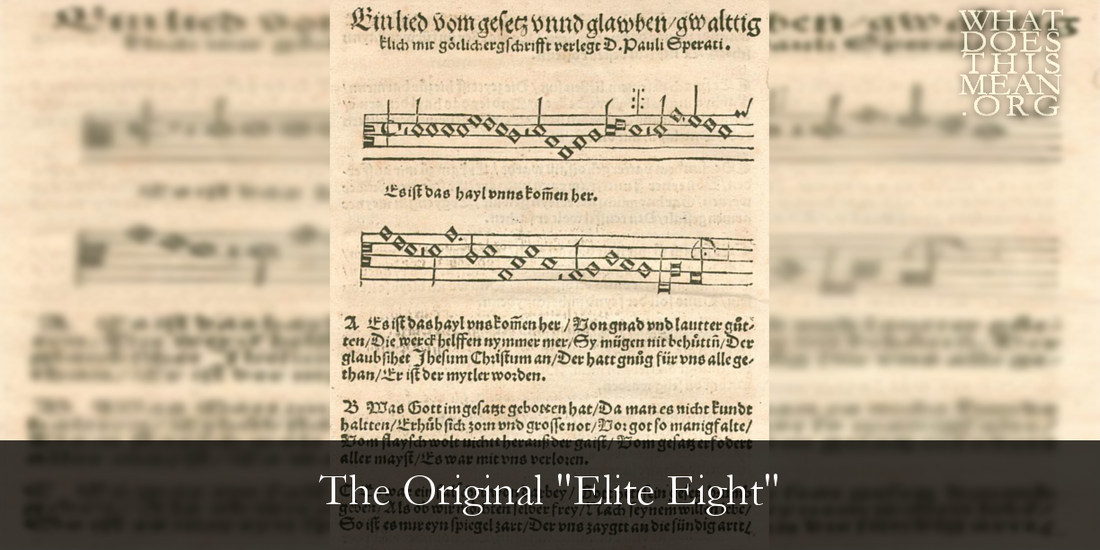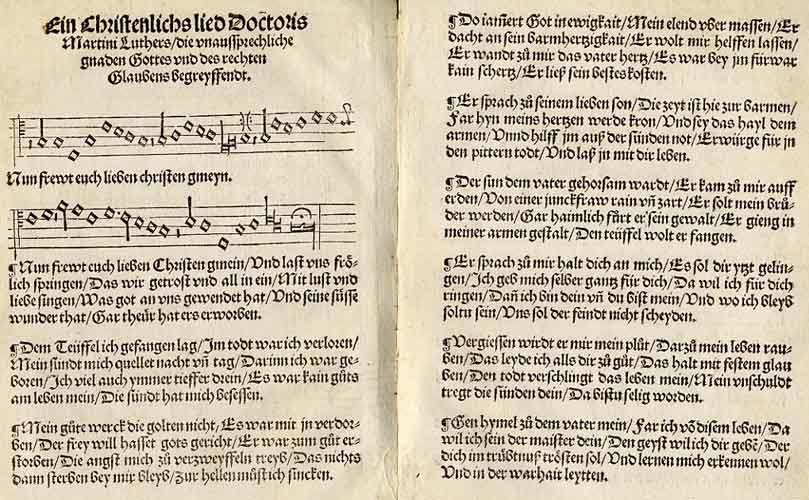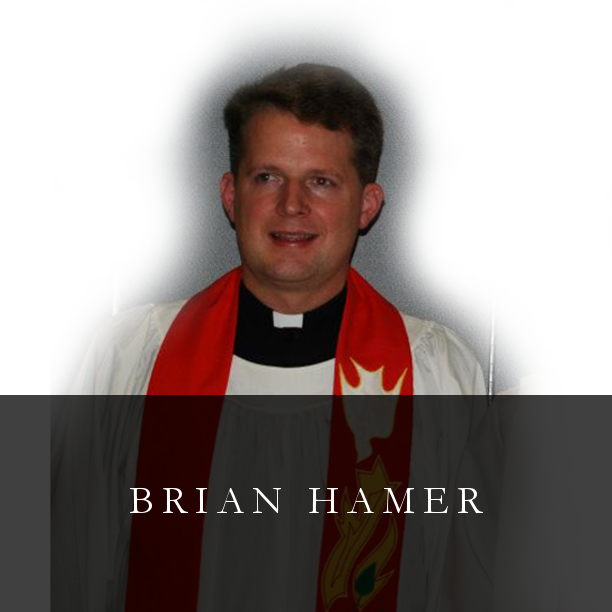Be on your guard and judge them aright.
Where God is building his church and word,
There comes the devil with lie and sword.
So which hymns qualify as The Elite Eight? The following “score card” is based in part on the research of Jane Schatkin Hettrick, a prominent Lutheran church musician in New York, who was kind enough to examine the facsimile edition of the first Lutheran hymnal for this issue of “Lifted Voice.”
| Nun freut euch, lieben Christen g'mein (Martin Luther, 1483-1546) “Dear Christians, One and All, Rejoice” (Lutheran Service Book [LSB] 556) The same tune is given that is usually sung today, as seen in this image: |
| Es ist das Heil uns kommen her (Paul Speratus, 1484-1551) “Salvation unto Us Has Come” (LSB 555) Again, the same tune is provided that is usually sung with this hymn today. In the following video, notice the image of this hymn from “The Book of Eight” in the upper-right hand corner and try to follow the melody (including the repeat of the first phrase) while the organist plays a 19th century version of the chorale: |
| In Gott gelaub ich, das er hat (Paul Speratus) “In God I Believe that He has Created” (tune provided) |
| Hilf Gott, wie ist der Menschen Not (Paul Speratus) “God Help, as the Need of Men is so Great” (text only) |
| Ach Gott, vom Himmel sieh darein (Martin Luther) “O Lord, Look Down from Heaven, Behold” (The Lutheran Hymnal [TLH] 260, with tune provided) |
| Es spricht der Unweisen Mund wohl (Martin Luther) “The Foolish Mouth Speaks” (Psalm 14:1) The singer is instructed to sing this text to the same tune as Ach Gott, but the tune is not reprinted. |
| Der Psalm De profundis (Martin Luther) or Aus Tiefer not “From Depths of Woe I Cry to Thee” (LSB 607) The tune is given, but it is a different tune than the one used today. Readers might recognize the original tune from its use in the 2003 movie, Luther: |
| In Jesu Namen wir heben an (anonymous, setting for two voices) “In Jesus’ Name We Begin” The two-part setting was certainly intended for a choir, but the book as a whole was certainly intended for individuals to purchase and bring to church. |
Of these eight hymns, it is fairly easy to determine The Final Four by noticing the four hymns which have English hymnal references. Luther’s “Out of the Depths” has stood the test of time as a superb Psalm hymn, although the tune included in the first Lutheran hymnal is rarely used today. The textual fidelity to Psalm 130, combined with a tune that musically rises “out of the depths,” is in no danger of oblivion. By contrast, “O Lord, Look Down from Heaven, Behold” seems to teeter on the brink of elimination since it is not included in most Lutheran hymnals on American soil today (with a few exceptions), although it still seems to be holding its own in Europe.
The two hymn that have probably had the most impact through the centuries are the first two hymns in this hymnal, “Dear Christians, One and All, Rejoice” and “Salvation unto Us has Come,” which are also adjacent to one another Lutheran Service Book, but in the reverse order. Listen, for a moment, to a few German stanzas of “Dear Christians,” Luther’s first congregational hymn, sung in the following video with the full resources of congregation, choirs, and instruments, as it might have been sung in the days of J. S. Bach:
| Sung by the small choir, then repeated by the congregation: Dear Christians, one and all, rejoice, With exultation springing, And, with united heart and voice And holy rapture singing, Proclaim the wonders God hath done, How His right arm the victory won; Right dearly it hath cost Him. Sung by the full choir with period brass instruments: Fast bound in Satan’s chains I lay, Death brooded darkly o’er me, Sin was my torment night and day, In sin my mother bore me; Yea, deep and deeper still I fell, Life had become a living hell, So firmly sin possessed me. Sung by the congregation: My own good works availed me naught, No merit they attaining; Free will against God’s judgment fought, Dead to all good remaining. My fears increased till sheer despair Left naught but death to be my share; The pangs of hell I suffered. Sung by the children’s choir: But God beheld my wretched state Before the world’s foundation, And, mindful of His mercies great, He planned my soul’s salvation. A father’s heart He turned to me, Sought my redemption fervently: He gave His dearest Treasure. |
| All blessing, honor, thanks and praise To Father, Son, and Spirit The God who saved us by His grace All glory to His merit. O triune God in heav’n above, You have revealed Your saving love; Your blessed name we hallow. (LSB 555.10) |




 RSS Feed
RSS Feed
